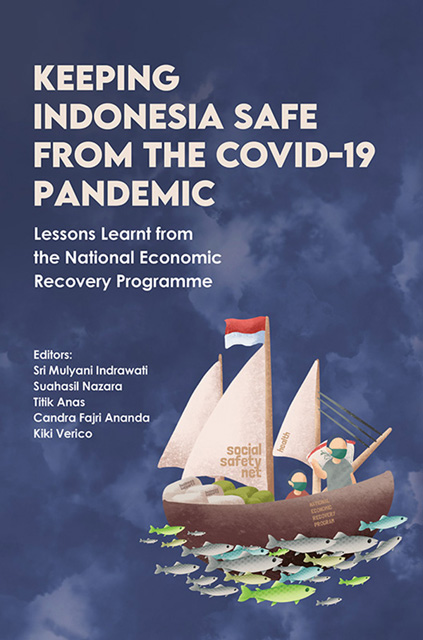 Keeping Indonesia Safe from the COVID-19 Pandemic
Keeping Indonesia Safe from the COVID-19 Pandemic Book contents
- Frontmatter
- Contents
- List of Figures
- List of Tables
- List of Boxes, Annexes and Appendixes
- Acknowledgements
- Glossary
- The Contributors
- Foreword: Keeping Indonesia Safe from the COVID-19 Pandemic Lessons Learnt from the National Economic Recovery Programme
- Part I Health Shock
- Part II Economic Shock: The Framework
- Part III Revenue Shock And Response
- Part IV Expenditure Side (Human Capital)
- Part V Expenditure Side (Msmes And Corporate Sector)
- Part VI Regional Dynamics
- Part VII New Ways Of Working
- Index
13 - Weathering and Recovering from the Pandemic Lesson Learnt from MSMEs in Indonesia
Published online by Cambridge University Press: 30 June 2023
- Frontmatter
- Contents
- List of Figures
- List of Tables
- List of Boxes, Annexes and Appendixes
- Acknowledgements
- Glossary
- The Contributors
- Foreword: Keeping Indonesia Safe from the COVID-19 Pandemic Lessons Learnt from the National Economic Recovery Programme
- Part I Health Shock
- Part II Economic Shock: The Framework
- Part III Revenue Shock And Response
- Part IV Expenditure Side (Human Capital)
- Part V Expenditure Side (Msmes And Corporate Sector)
- Part VI Regional Dynamics
- Part VII New Ways Of Working
- Index
Summary
PROLOGUE
Micro, Small and Medium Enterprises (MSMEs) have been critical to the Indonesian economy, not only for their contribution to GDP and job creation but also for their resilience throughout prior economic crises, thanks to their agility, flexibility and less dependency on external resources. However, the COVID-19 pandemic has hit the MSMEs severely, as it unprecedentedly disrupted supply, distribution and demand simultaneously. UNDP and LPEM FEB UI (2020) revealed that nine out of ten MSMEs suffered a drop in demand for their products during the pandemic, while around 53 per cent recorded a decrease in asset value.
The survival of MSMEs in the current pandemic is contingent on both internal and external factors. Internally, MSMEs have to adjust their financial, production and marketing strategies to cope with the changing business landscape. Externally, given the scale of the pandemic, assistance from both government and non-government agencies is crucial.
Three major challenges, however, stand in the way of implementing these programmes. The Government of Indonesia (GoI) needed to design assistance programmes that can mitigate various types of hardships encountered by MSMEs due to the pandemic. The GOI then launched the largest economic recovery programmes for MSMEs in the country's history including, but not limited to, deferred principal and interest loan payments, loan interest subsidies, tax incentives and working capital loan guarantees. Second, the GOI needed to ensure all MSMEs had the same access to the programmes. This was not a simple matter, given the unavailability of a single updated MSMEs database in Indonesia. Third, the assistance should be designed not only to ease the impact of the pandemic but also to help MSMEs jumpstart and transform their businesses in the recovery period.
This chapter provides an analysis of the impact of the pandemic on MSMEs, the GOI's response to mitigate the impact on MSMEs, the effectiveness of government support, and MSMEs’ internal strategy and business transformation to weather and recover from the pandemic.
MSMEs IN INDONESIA PRIOR TO THE PANDEMIC
Characteristics of MSMEs
MSMEs in many countries across the globe, including Indonesia, have shown their resilience in previous crises, especially the 1998 Asian Financial Crisis (AFC) and the 2007–8 Global Financial Crisis (GFC) (Gunadi et al. 2021; Iborra, Safón, and Dolz 2020).
- Type
- Chapter
- Information
- Keeping Indonesia Safe from the COVID-19 PandemicLessons Learnt from the National Economic Recovery Programme, pp. 423 - 454Publisher: ISEAS–Yusof Ishak InstitutePrint publication year: 2022
